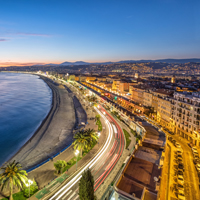Moving to Marseille, France
Last updated on Jan 06, 2025
Summary: Moving to Marseille, France: Expats, retirees and digital nomads talk about everything you need to know before moving to Marseille.
What do I need to know before moving to Marseille?
When we asked people what advice they would give someone preparing to move to Marseille, they said:
"Marseille is the second largest city in France and is known for its diverse culture and rich history. Before moving to Marseille, expats should know that the city has a Mediterranean climate with hot summers and mild winters. The cost of living in Marseille is generally lower than in Paris, but still higher than in many other countries. Expats should be aware that while many people in Marseille speak English, it is highly recommended to learn French to fully integrate into the local culture and society. Marseille is a port city with a strong maritime tradition, so seafood is a staple in the local cuisine. The city is known for its vibrant arts scene, with numerous museums, galleries, and theaters. Public transportation in Marseille is extensive and reliable, including buses, trams, and a metro system. Marseille has a reputation for being a bit rough around the edges, with higher crime rates than some other French cities, so expats should take precautions to ensure their safety. Healthcare in France is of a high standard, and expats living in Marseille will have access to excellent medical facilities. Marseille is home to a diverse population, with many immigrants from North Africa and other parts of the Mediterranean, which contributes to the city's multicultural atmosphere. The city is also home to several universities and higher education institutions, making it a vibrant place for students and academics. Expats should also be aware that Marseille is a city of neighborhoods, each with its own distinct character and atmosphere. Finally, expats moving to Marseille should be prepared for the Mistral, a strong, cold wind that blows through the city, particularly in the winter and spring," said one expat in Marseille.
How do I find a place to live in Marseille?
We asked expats how they chose their neighborhood and found a place to live. They answered:
"Finding a place to live in Marseille, involves several steps. First, you need to determine your budget and the type of accommodation you're looking for. This could range from a small studio apartment to a larger family home. Next, you should research the different neighborhoods in Marseille to find one that suits your lifestyle and needs. Some popular areas include Le Panier, known for its old-world charm, or La Joliette, which is a modern, bustling area with many shops and restaurants. Once you've identified your preferred area, you can start your search for a property. There are several online platforms that list properties for rent or sale in Marseille, such as Seloger, Leboncoin, or Pap. These websites allow you to filter your search based on your preferences, such as the number of bedrooms, price range, and location. In addition to online searches, you might also consider hiring a real estate agent. They can provide valuable local knowledge and help you navigate the French property market. When you find a property you're interested in, you'll need to contact the landlord or estate agent to arrange a viewing. It's important to ask plenty of questions during the viewing to ensure the property meets your needs. If you decide to proceed with a property, you'll need to provide several documents to the landlord or estate agent. These typically include proof of income, identification, and possibly a reference from a previous landlord. Once your application is accepted, you'll sign a lease agreement. Be sure to read this carefully and understand all the terms before signing. Finally, you'll need to arrange utilities and internet for your new home. Some properties may include these in the rent, while others will require you to set these up yourself. Remember, finding a place to live can take time, so it's important to start your search well in advance of your move to Marseille," remarked one expat in Marseille, France.

We are the best possible negotiator to help our expatriate clients to safely, efficiently and effectively find the right property in the right place in the French Riviera. Whether buying or renting, French Riviera House Hunting's objective is to find the best place for you, making sure that there are no hidden problems in the acquisition or renting process!
Click connect to have our partner contact you via e-mail and/or phone.

We are the best possible negotiator to help our expatriate clients to safely, efficiently and effectively find the right property in the right place in the French Riviera. Whether buying or renting, French Riviera House Hunting's objective is to find the best place for you, making sure that there are no hidden problems in the acquisition or renting process!
Click connect to have our partner contact you via e-mail and/or phone.
What is a typical expat home or apartment like in Marseille?
"A typical expat home or apartment in Marseille, is often located in the city center or in the more residential neighborhoods. These homes are usually in close proximity to local amenities such as shops, restaurants, and public transportation. The apartments are often housed in traditional French buildings, with high ceilings, large windows, and sometimes even with original features like wooden beams or ornate moldings. The size of the apartment can vary, but it is common to find one or two-bedroom apartments for expats. The living area is usually spacious, with a separate kitchen equipped with modern appliances. Some apartments may also have a small balcony or terrace, offering views of the city or the sea. The interior design often combines traditional French charm with modern comfort. It's common to see a mix of antique and contemporary furniture, with a color palette that reflects the Mediterranean surroundings, using shades of blue, white, and earth tones. Most expat homes in Marseille come furnished, but there are also options for unfurnished apartments for those who prefer to bring or buy their own furniture. The apartments usually have a bathroom with a shower or bathtub, and some may even have an additional guest toilet. In terms of utilities, most apartments in Marseille are equipped with central heating, and some may also have air conditioning, which can be a relief during the hot summer months. Internet connection and cable TV are usually included in the rent, and some buildings may also offer amenities like a communal laundry room or a bicycle storage area. Safety is also a consideration for many expats, so it's common to find apartments in Marseille with secure entry systems, and some may also have a concierge service. Despite being in the heart of the city, many expat homes in Marseille offer a peaceful and quiet living environment, making it a comfortable place to live and work," remarked one expat who made the move to Marseille.
What is the average cost of housing in Marseille?
If you are thinking about moving to Marseille, cost of living in probably a key consideration. Expats commented about the cost of housing:
"The average cost of housing in Marseille can vary greatly depending on the location and size of the property. As of recent data, for purchasing a property, the average price per square meter can range from a lower end of around €2,500 to a higher end of around €4,500. For renting, the average cost can range from €10 to €15 per square meter per month. However, these prices can fluctuate based on market conditions and other factors," said one expat in Marseille.
Should I buy or rent a home in Marseille?
If you have not spent a lot of time in Marseille, you should rent before even thinking about buying. We asked expats there about the buy vs. rent decision:
"I rent, this has been very easy. I avoid buying because I know I plant to move again in a few years and experience a new place," replied a member in Marseille.
"The decision to buy or rent a home in Marseille, largely depends on your personal circumstances, financial situation, and long-term plans. If you plan to stay in Marseille for a long period, buying a home could be a good investment. Owning a property allows you to build equity over time and could potentially provide a return on investment if property values increase. On the other hand, renting might be a better option if you're not planning to stay in Marseille for a long time. Renting offers more flexibility, as you can move more easily if your circumstances change. It also means you won't have to worry about property maintenance and other responsibilities that come with homeownership. Financially, buying a home requires a significant upfront cost, including a down payment and closing costs. You'll also need to consider ongoing costs like mortgage payments, property taxes, insurance, and maintenance. Renting, meanwhile, typically involves lower upfront costs, although monthly rent payments can be high in some areas of Marseille. It's also worth considering the current state of the property market in Marseille. If property prices are high and predicted to fall, it might be better to rent for a while and wait for prices to drop before buying. Conversely, if prices are low and expected to rise, buying could be a good investment. In conclusion, the decision to buy or rent a home in Marseille should be based on your personal and financial circumstances, as well as the current state of the property market. It's always a good idea to seek advice from a financial advisor or real estate professional before making a decision," commented one expat who made the move to Marseille.
What should I pack when moving to Marseille?
We asked people living in Marseille to list three things they wish they had brought and three they wish they had left behind. They responded:
"When moving to Marseille, you should pack a variety of clothing to accommodate for the Mediterranean climate, including lightweight clothing for the hot summers and warmer clothing for the cooler winters. Don't forget a good quality raincoat or umbrella for the occasional rainy days. Pack comfortable walking shoes for exploring the city and its hilly terrain, as well as more formal attire for dining out or attending events. Bring your essential toiletries, but remember that you can also buy many items locally. However, if you have specific brands or products you prefer, it may be a good idea to bring them with you. Ensure you have all necessary documents such as your passport, visa, driver's license, and any other identification. It's also a good idea to bring copies of important documents like your birth certificate, medical records, and insurance policies. Pack any prescription medications you take regularly, along with a copy of your prescription. Bring a French phrasebook or dictionary to help with the language barrier, as well as any electronic devices you use regularly, like your laptop or smartphone. Remember to pack a power adapter for your electronics, as France uses a different type of plug than many other countries. If you're planning on cooking, you might want to bring some of your favorite non-perishable food items, as they may be hard to find in France. Lastly, bring personal items that will make your new place feel like home, such as photos, small keepsakes, or your favorite books," said one expat who made the move to Marseille.
 French Riviera House Hunting - FRH
French Riviera House Hunting - FRHConnect
We are the best possible negotiator to help our expatriate clients to safely, efficiently and effectively find the right property in the right place in the French Riviera. Whether buying or renting, French Riviera House Hunting's objective is to find the best place for you, making sure that there are no hidden problems in the acquisition or renting process!
Click connect to have our partner contact you via e-mail and/or phone.
 French Riviera House Hunting - FRH
French Riviera House Hunting - FRHWe are the best possible negotiator to help our expatriate clients to safely, efficiently and effectively find the right property in the right place in the French Riviera. Whether buying or renting, French Riviera House Hunting's objective is to find the best place for you, making sure that there are no hidden problems in the acquisition or renting process!
Connect
Click connect to have our partner contact you via e-mail and/or phone.
What cultural faux pas should I try to avoid making in Marseille?
We asked people in Marseille if they could share any humorous cultural blunders they commited. For new expats, keep in mind that these incidents are an inevitable part of expat life. Learning to laugh about them is the key!:
"When visiting Marseille, it's important to avoid making the cultural faux pas of not greeting people properly. Always say "Bonjour" (Good day) or "Bonsoir" (Good evening) when entering shops, restaurants, or when addressing someone. Avoid speaking loudly in public places. The French value discretion and may find loud conversations or behavior to be disrespectful. Don't rush your meals. In France, dining is considered an experience to be savored, not rushed. Take your time and enjoy your food. Avoid discussing money or asking about someone's income. This is considered impolite and too personal. Don't expect shops, restaurants, or attractions to be open all day. Many businesses in France close for a few hours in the afternoon. Avoid wearing overly casual clothing, especially in more formal settings. The French take pride in their appearance and may view sloppy attire as disrespectful. Don't assume everyone speaks English. While many people in Marseille do speak English, it's polite to ask if they do before starting a conversation. Avoid being overly friendly or familiar with people you've just met. The French tend to be more reserved and may find this off-putting. Don't forget to say "please" ("s'il vous plaît") and "thank you" ("merci"). Good manners are highly valued in French culture. Avoid criticizing France or comparing it unfavorably to your home country. This is considered rude and disrespectful," remarked one expat who made the move to Marseille.
About the Author
 Joshua Wood, LPC is one of the Founders of Digital Nomad Exchange and serves as Co-President of Expat Exchange. Prior to Expat Exchange and Digital Nomad Exchange, Joshua worked for NBC Cable (MSNBC and CNBC
Primetime). Joshua has a BA from Syracuse and a Master's in Clinical and Counseling Psychology from Fairleigh Dickinson University. Mr. Wood is also a licensed counselor and psychotherapist.
Joshua Wood, LPC is one of the Founders of Digital Nomad Exchange and serves as Co-President of Expat Exchange. Prior to Expat Exchange and Digital Nomad Exchange, Joshua worked for NBC Cable (MSNBC and CNBC
Primetime). Joshua has a BA from Syracuse and a Master's in Clinical and Counseling Psychology from Fairleigh Dickinson University. Mr. Wood is also a licensed counselor and psychotherapist.
Some of Joshua's articles include Pros and Cons of Living in Portugal, 10 Best Places to Live in Ireland and Pros and Cons of Living in Uruguay. Connect with Joshua on LinkedIn.
![]() France Forum
France Forum
Talk with other digital nomads and expats in France on our France forum - meet people, get advice and help others.
![]() Contribute
Contribute
Help others in France by answering questions about the challenges and adventures of living in France.
Digital Nomads in France offer advice about healthcare, hospital visits, emergency rooms visits, finding a doctor and buying health insurance in France.

 Marseille, France
Marseille, France


